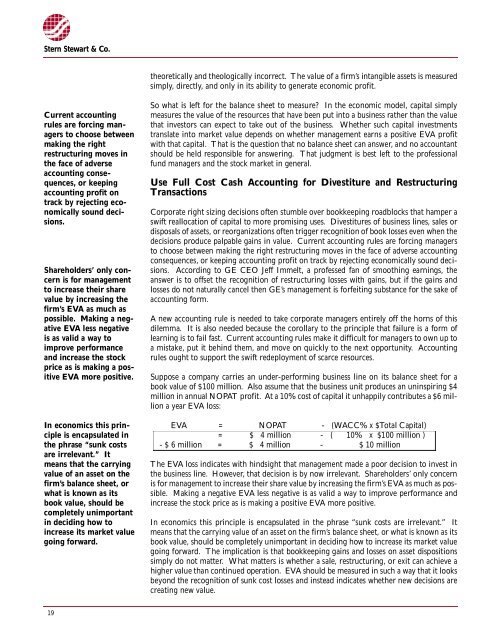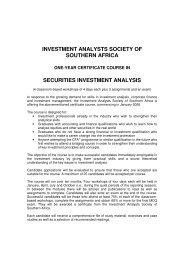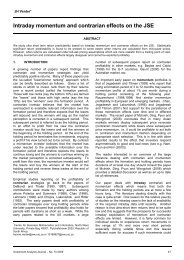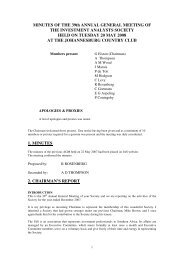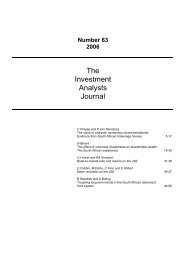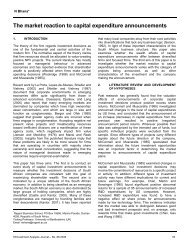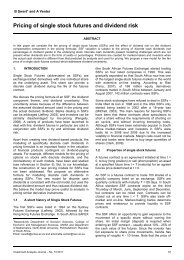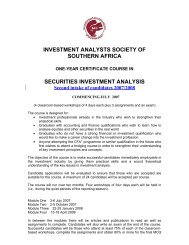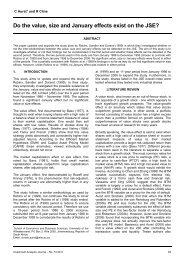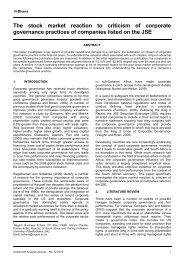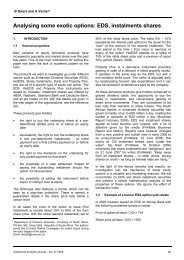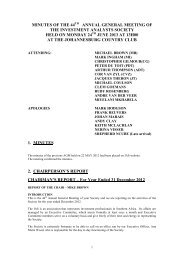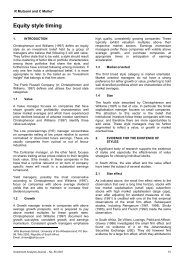Accounting is Broken - Investment Analysts Journal
Accounting is Broken - Investment Analysts Journal
Accounting is Broken - Investment Analysts Journal
Create successful ePaper yourself
Turn your PDF publications into a flip-book with our unique Google optimized e-Paper software.
Stern Stewart & Co.<br />
t h e o retically and theologically incorrect. The value of a firm ’s intangible assets <strong>is</strong> measure d<br />
s i m p l y, dire c t l y, and only in its ability to generate economic pro f i t .<br />
C u rrent accounting<br />
rules are forcing managers<br />
to choose between<br />
making the right<br />
re s t ructuring moves in<br />
the face of adverse<br />
accounting consequences,<br />
or keeping<br />
accounting profit on<br />
track by rejecting economically<br />
sound dec<strong>is</strong><br />
i o n s .<br />
S h a reholders’ only conc<br />
e rn <strong>is</strong> for management<br />
to increase their share<br />
value by increasing the<br />
f i rm ’s EVA as much as<br />
possible. Making a negative<br />
EVA less negative<br />
<strong>is</strong> as valid a way to<br />
i m p rove perf o rm a n c e<br />
and increase the stock<br />
price as <strong>is</strong> making a positive<br />
EVA more positive.<br />
In economics th<strong>is</strong> principle<br />
<strong>is</strong> encapsulated in<br />
the phrase “sunk costs<br />
a re irrelevant.” It<br />
means that the carry i n g<br />
value of an asset on the<br />
f i rm ’s balance sheet, or<br />
what <strong>is</strong> known as its<br />
book value, should be<br />
completely unimport a n t<br />
in deciding how to<br />
i n c rease its market value<br />
going forw a rd .<br />
So what <strong>is</strong> left for the balance sheet to measure? In the economic model, capital simply<br />
m e a s u res the value of the re s o u rces that have been put into a business rather than the value<br />
that investors can expect to take out of the business. Whether such capital investments<br />
translate into market value depends on whether management earns a positive EVA pro f i t<br />
with that capital. That <strong>is</strong> the question that no balance sheet can answer, and no accountant<br />
should be held responsible for answering. That judgment <strong>is</strong> best left to the pro f e s s i o n a l<br />
fund managers and the stock market in general.<br />
Use Full Cost Cash <strong>Accounting</strong> for Divestiture and Restru c t u r i n g<br />
Tr a n s a c t i o n s<br />
Corporate right sizing dec<strong>is</strong>ions often stumble over bookkeeping roadblocks that hamper a<br />
swift reallocation of capital to more prom<strong>is</strong>ing uses. Divestitures of business lines, sales or<br />
d<strong>is</strong>posals of assets, or re o rganizations often trigger recognition of book losses even when the<br />
dec<strong>is</strong>ions produce palpable gains in value. Current accounting rules are forcing managers<br />
to choose between making the right re s t ructuring moves in the face of adverse accounting<br />
consequences, or keeping accounting profit on track by rejecting economically sound dec<strong>is</strong>ions.<br />
According to GE CEO Jeff Immelt, a professed fan of smoothing earnings, the<br />
answer <strong>is</strong> to offset the recognition of re s t ructuring losses with gains, but if the gains and<br />
losses do not naturally cancel then GE’s management <strong>is</strong> forfeiting substance for the sake of<br />
accounting form .<br />
A new accounting rule <strong>is</strong> needed to take corporate managers entirely off the horns of th<strong>is</strong><br />
dilemma. It <strong>is</strong> also needed because the coro l l a ry to the principle that failure <strong>is</strong> a form of<br />
l e a rning <strong>is</strong> to fail fast. Current accounting rules make it difficult for managers to own up to<br />
a m<strong>is</strong>take, put it behind them, and move on quickly to the next opport u n i t y. <strong>Accounting</strong><br />
rules ought to support the swift redeployment of scarce re s o u rc e s .<br />
Suppose a company carries an under- p e rf o rming business line on its balance sheet for a<br />
book value of $100 million. Also assume that the business unit produces an uninspiring $4<br />
million in annual NOPAT profit. At a 10% cost of capital it unhappily contributes a $6 million<br />
a year EVA loss:<br />
E VA = NOPAT - (WACC% x $Total Capital)<br />
= $ 4 million - ( 10% x $100 million )<br />
- $ 6 million = $ 4 million - $ 10 million<br />
The EVA loss indicates with hindsight that management made a poor dec<strong>is</strong>ion to invest in<br />
the business line. However, that dec<strong>is</strong>ion <strong>is</strong> by now irrelevant. Shareholders’ only concern<br />
<strong>is</strong> for management to increase their share value by increasing the firm ’s EVA as much as possible.<br />
Making a negative EVA less negative <strong>is</strong> as valid a way to improve perf o rmance and<br />
i n c rease the stock price as <strong>is</strong> making a positive EVA more positive.<br />
In economics th<strong>is</strong> principle <strong>is</strong> encapsulated in the phrase “sunk costs are irrelevant.” It<br />
means that the carrying value of an asset on the firm ’s balance sheet, or what <strong>is</strong> known as its<br />
book value, should be completely unimportant in deciding how to increase its market value<br />
going forw a rd. The implication <strong>is</strong> that bookkeeping gains and losses on asset d<strong>is</strong>positions<br />
simply do not matter. What matters <strong>is</strong> whether a sale, re s t ructuring, or exit can achieve a<br />
higher value than continued operation. EVA should be measured in such a way that it looks<br />
beyond the recognition of sunk cost losses and instead indicates whether new dec<strong>is</strong>ions are<br />
c reating new value.<br />
19


